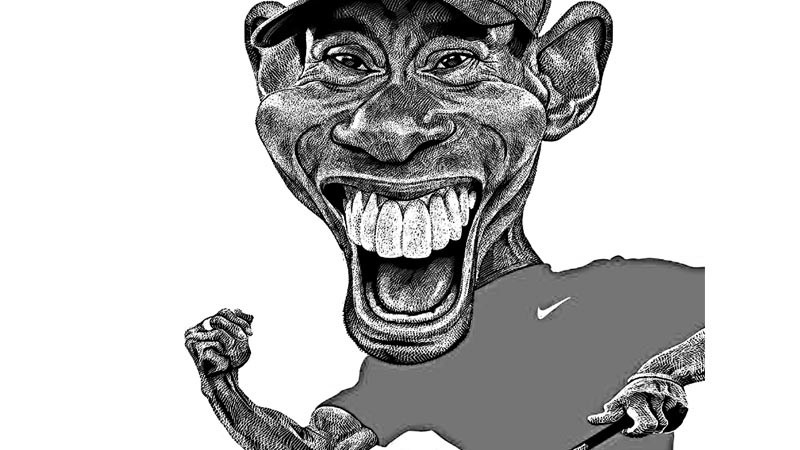Tiger Woods’ Masters win: Redemption time

It’s January 2017 and Roger Federer has just come back from injury to win his first Grand Slam in almost five years at the Australian Open, aged 35.
In front of us is a 41-year-old Tiger Woods, riddled with back pain but ready to begin his own comeback of sorts — to merely compete in his first event in 15 months after three of what would become four back surgeries — at the Omega Dubai Desert Classic. The tiny media room at Emirates Golf Club is packed with journalists waiting on every word the beleaguered 14-time Major winner has to say, but somehow we’ve got to the end of his pre-tournament press conference and no one has dared ask a question about that all too obvious comparison.
The microphone comes to me, and nervous, knees trembling, voice quaking, certain I was about to faint, vomit, soil myself or become a meme for the world to ridicule, I confront that elephant in the room. First I go in soft, “What did you make of Federer’s comeback?” — and then, voice fading — “Can you do the same?”
Read More: Tiger Woods says recovering at home after crash
I don’t think he heard the last part, but Tiger likes it, and I’m relieved, it gives him an opportunity to rattle on about how happy he was for his friend Roger and how they both share the same sponsor — Nike, but then I interrupt him and he shoots daggers.
“ … but I said, can you do the same?”
A woman exhales nervously in the front row, the stenographer stops, and you can hear a pin drop among the more senior reporters on tour who give me a look as if to say, “What have you just done?”
I’ve seen Tiger decimate journalists for asking simple questions about his club selection and at this point I just want to slide down the wall and under the carpet. Off camera when Tiger’s disingenuous smile recoils, his heavies shove you out the way, and his diatribe of hypnotic rhyming couplets grind to a halt, there’s absolutely zero warmth.
But he humours me, snarlingly, while never losing eye contact, and the day is saved.
He says something like “I may not be able to hit it as far anymore, but you can play smarter to get to the hole, just as Federer has changed his style to combat age by shortening up points and not hanging around the baseline for so long.”
I’m not even listening, I’m just happy to have survived, everyone now has a story from the question no one dared ask, they all ran with it the next day, but no one truly believes his faux conviction, not even him — you can see it in his eyes — he pulls out of the tournament two days later and not long after admits he’s close to giving up the game completely.
I realise now that no one else dared ask Tiger that question because they just didn’t believe he would, or ever could do “a Federer”.
Tiger was at that point over 40, hadn’t won a Major in nine years, and had been through a lot worse, both injury-wise and personally with the very public unfurling of his marriage. Federer had lost a few games and a few hours in physio; Tiger had lost everything, his wife, children, even his dignity.
Golf was a mental game as well and it was clear Tiger’s head hadn’t been right perhaps even as far back as the death of his dad in 2006, which preceded the breakdown of his marriage three years later after numerous infidelities and a DUI in August 2017.
Fall from grace
What settled and stable Federer had overcome was child’s play compared to what Tiger had to do, because he had lost so much more and fallen so much further.
Read More: Tiger Woods transferred to Los Angeles hospital
As a black American too he was heralded for opening doors to minorities in a rich white man’s game, but with that rise and meaning came extra responsibility and even more vilification when he fell because of who he was and what sport he was in. He was finished in a way a rich white European would never be, in a class of sport where dalliances would never be as accepted as say a working class footballer or rugby player having an affair.
That’s what makes last Sunday — Tiger’s first Major win in 11 years at the age of 43, and after everything he had been through — all the more remarkable.
People will now ask if he can go on to beat Jack Nicklaus’ record of 18 Majors, much like Federer has topped his own sport, but they are forgetting one thing. Golf is a game against yourself, not others, and he’s won. He’s beaten his demons, got back to the top from the depths of despair and redeemed himself as a classy family man, seen hugging his mother and children at the last hole just as he did his late dad after his first Major win at Augusta back in 1997. For me this ending is perfect and if he never picks up a club again it’s OK.
To have started and finished this story at Augusta as well, where caddies had to be black up until 1975 and no black players were allowed to become members until 1990, speaks volumes.
He’s said and done everything for this to be considered the greatest of comebacks at the most meaningful of venues and it will silence even his most vociferous of critics.
Ashley Hammond is the chief reporter of an English daily



